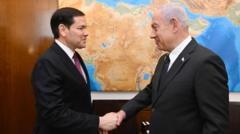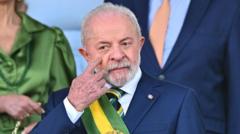What Happened at Qatar's Arab-Islamic Emergency Summit on the Israeli Strike?

Published: 2025-09-15 07:05:38 | Category: technology
In response to Israel's recent air strike targeting Hamas leaders in Doha, an emergency meeting of Arab and Islamic states is underway in Qatar. The draft resolution, which has been reviewed by the Reuters news agency, strongly condemns Israel's actions, labelling them as "hostile acts" that threaten peace and coexistence in the region. The resolution accuses Israel of committing genocide, ethnic cleansing, and starvation. However, Israel has firmly rejected these allegations. The meeting raises questions about the potential for decisive action, as analysts suggest that a military response is unlikely.
Last updated: 09 October 2023 (BST)
Key Takeaways
- An emergency meeting of Arab and Islamic states is taking place in Qatar following an Israeli air strike.
- The draft resolution condemns Israel's actions, describing them as genocidal and threatening to peace.
- Israel has denied these allegations, asserting the necessity of the strike for peace negotiations.
- Qatar continues to play a significant role in mediating negotiations between Hamas and Israel.
- The international community, including the UN Security Council, has expressed solidarity with Qatar.
The Context of the Meeting
The emergency meeting in Qatar arises from a volatile backdrop marked by ongoing conflict between Israel and Hamas, particularly pertaining to the Gaza Strip. The air strike on 9 September, which targeted key Hamas figures, has escalated tensions further. This incident has prompted widespread condemnation and calls for action from various Arab and Islamic nations.
Understanding the Allegations
The draft resolution put forth during the meeting describes Israel's actions as tantamount to genocide and ethnic cleansing. These terms carry significant legal implications under international law, as they suggest systematic efforts to eliminate or displace a particular group. The accusation of starvation also highlights the dire humanitarian conditions faced by Palestinians in Gaza, exacerbated by ongoing military actions and blockades.
Israel's Defence
In the wake of these accusations, Israeli President Isaac Herzog defended the air strike, suggesting it was a necessary measure to facilitate peace negotiations. Herzog's statement implies a belief that the removal of certain Hamas leaders could lead to a more conducive environment for dialogue. This perspective, however, is met with skepticism from various international observers who question the efficacy and morality of such military actions.
International Reactions
The international community's response has been varied. The United Nations Security Council condemned the air strike and emphasised the need for de-escalation in the region. Council members expressed solidarity with Qatar, highlighting the country's critical role in mediating peace negotiations. Meanwhile, Qatari Prime Minister Mohammed bin Abdulrahman bin Jassim al-Thani has called for an end to what he terms “double standards” in the application of international law, urging a more balanced approach to accountability.
The Role of Qatar
Qatar has positioned itself as a key mediator in the Israeli-Palestinian conflict, maintaining a delicate balance between supporting Hamas and fostering good relations with Western powers, including the United States. Hosting the Hamas political bureau since 2012, Qatar has facilitated indirect negotiations aimed at securing ceasefires and peace. This unique position draws both praise and criticism, as it navigates complex diplomatic waters while striving to alleviate the humanitarian crisis in Gaza.
US Involvement and Perspectives
US President Donald Trump has acknowledged Qatar as a vital ally in the region, though he also indicated the need for caution in military matters. Secretary of State Marco Rubio's upcoming discussions with Israeli leaders suggest continued US engagement in Middle Eastern affairs, particularly regarding the Gaza conflict. Rubio’s remarks on the incident reflect a desire for a more measured approach to military engagement, aligning with calls for de-escalation.
What Happens Next?
The outcome of the emergency meeting remains uncertain. Analysts suggest that while the resolution may bolster diplomatic efforts, the chances of a military response from Arab states are low, given the complexities involved. The focus may shift towards diplomatic avenues, with Qatar continuing its role as a mediator. However, with tensions remaining high, the situation could evolve rapidly, necessitating close monitoring of developments.
Implications for Peace Efforts
The recent air strike and the ensuing diplomatic responses highlight the fragility of peace efforts in the region. As diplomatic discussions unfold, the international community must grapple with the challenges of addressing humanitarian concerns while facilitating dialogue between conflicting parties. The resolution's condemnation of Israel's actions may galvanise support for Palestinian rights but could also complicate future negotiations.
FAQs
What prompted the emergency meeting in Qatar?
The emergency meeting was convened in response to an Israeli air strike on Hamas leaders in Doha, which raised significant concerns about escalating violence and the humanitarian impact on Palestinians.
What does the draft resolution condemn?
The draft resolution condemns Israel's actions, labelling them as genocide, ethnic cleansing, and starvation, asserting that these actions threaten peace and coexistence in the region.
How has Israel responded to the allegations?
Israel has denied the allegations of genocide and ethnic cleansing, with President Isaac Herzog stating that the air strike was necessary to facilitate peace negotiations.
What is Qatar's role in the conflict?
Qatar has served as a mediator in the Israeli-Palestinian conflict, hosting the Hamas political bureau and facilitating indirect negotiations aimed at achieving peace and addressing humanitarian issues in Gaza.
What are the international responses to the air strike?
The international community, including the UN Security Council, has condemned the air strike and expressed solidarity with Qatar, emphasising the need for de-escalation in the region.
As tensions continue to rise and resolutions remain elusive, the international community faces the challenge of navigating a path towards lasting peace. How will the diplomatic efforts evolve in the coming weeks? #MiddleEast #QatarDiplomacy #PeaceProcess



